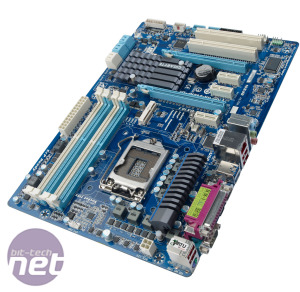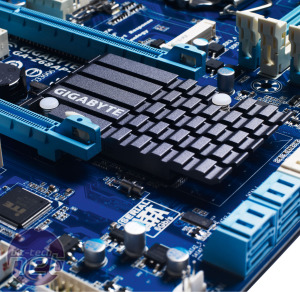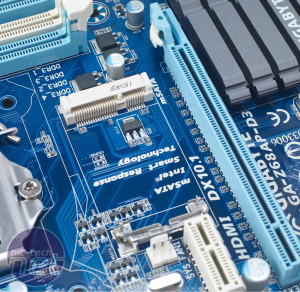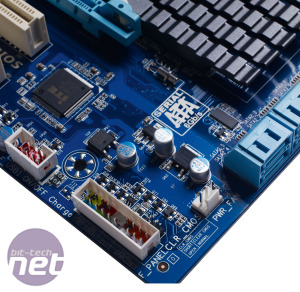
Performance Analysis
The Z68AP-D3 may be cheap, but it should still be quick in our tests. After all, our i5-2500K is no slouch in either 2D applications or games. Thankfully we weren’t disappointed, as the board’s scores were in line with other Z68-based motherboards we’ve seen.Its result of 1,582 in the image editing portion of the test, for instance, was quicker than the vastly more expensive ASRock Z68 Extreme4 Gen3. The GA-Z68AP-D3's video encoding performance was also good, placing it third in our stock speed table above even the Premium-Grade-wearing MSI P67A-GD53.
These results mean that the Z68AP-D3 scored a very reasonable overall score 1,920 - right in the middle of the table of other, more expensive boards that we’ve tested. Its gaming performance also proved to be reasonably competitive at stocks speeds, as the board's minimum frame rate of 89fps was equal to other good boards such as the Asus P8P67.
We were glad to see the stock speed results of the Z68AP-D3 match up to the other boards we’ve seen, but in truth we expected this. However, we weren't so uncertain about the board's overclocking prowess; how would such a cheap board stand up to having extra voltage shoved through its circuits?
Well, as it turns out, really rather well. We started off tentatively, glancing nervously at the VRM circuitry every time something made a noise in the labs but we needn’t have bothered - the board proved perfectly stable. After a little tinkering we even had our test chip running at a heady 4.9GHz - a full 1.6GHz faster than its rated speed and only a couple of hundred MHz slower than the best result we’ve seen.
At these settings it’s not surprising that the board sliced through our benchmarks like a Superlaser cuts through Alderaan, just without the millions of voices crying out in terror. Its overall benchmark score of 2,678 is very impressive for such a cheap board.
Gaming performance also reacted well to the extra frequency on tap, with the minimum frame rate jumping from 73fps to 80fps. However, we did have to pump an extra 0.16V through the CPU Vcore to keep this overclock stable - a marginally higher amount than the more expensive boards we’ve tested. This indicates that the Z68AP-D3 suffers from slightly more Vdroop than boards built around more premium components, which is unsurprising. We also had to push the QPI/VTT to 1.24V, the SA voltage to 1.055V and the PLL to 1.94V.
Conclusion
We’re slightly flabbergasted by the Gigabyte GA-Z68AP-D3. It hits a surprising price point for a decent Z68-based motherboard, and in doing so makes one of the key features of the Z68 chipset (Smart Response) actually relevant. This is great news, and when twinned with its good performance and overclocking, makes the board very appealing.It’s not for everyone, of course. Those looking to build a more premium system will prefer the enthusiast features, extra USB 3 ports and better VRM cooling built into boards such as the Asus Gene-Z. For those sitting on the fence about an upgrade to LGA1155, though, the cheap price of the Z68AP-D3 should offer enough persuasion to take the plunge.

-
Value24 / 25
-
Features19 / 30
-
Speed31 / 45


MSI MPG Velox 100R Chassis Review
October 14 2021 | 15:04












Want to comment? Please log in.